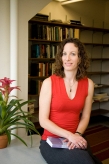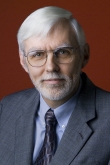COVER STORY
In the humanities, classrooms are labs and students are collaborators
(Page 3 of 4)Because Raskolnikov's new book will include an exploration of Chaucer's self-abasement (he was always apologizing for his work) and how that colors scholars' view of his gender identity, she added "Troilus and Criseyde" to the syllabus for her 3000-level Chaucer class. The poem is notorious for its weepy male hero whom scholars – and Raskolnikov's students – deride for his excessive emotionality.
But Raskolnikov challenges the assumptions underlying the students' judgment. "When you write about Chaucer, you realize he's struggling with the same issues we're struggling with now, like gender stereotypes," says Raskolnikov. And understanding what medieval figures like Chaucer have to say enables her to bring to the classroom a unique historical perspective on contemporary issues.
As Patrizia McBride, associate professor of German studies, points out, "Research in the humanities seems very specialized when you look at it from the outside, but what gets forgotten is that through the layer of specialization we're often talking about issues that we're grappling with today."

Karen Bennett, associate professor of philosophy See larger image
One of the most significant benefits of the classroom comes from the necessity of explaining the material. "The best way to fully understand a set of issues is to try to explain it to someone else," says associate professor of philosophy Karen Bennett, recalling times when she was preparing to teach something new that had seemed clear when she first read it, then suddenly realizing that the arguments made no sense, and she had to delve deeper into the material to be able to provide students with a coherent understanding.
Birthing ideas in the classroom
Chalk dust wafts through the small Goldwin Smith classroom as Raskolnikov draws a chart illustrating who knows what and when in "Troilus and Criseyde." The class has finally reached the end of the poem, and Raskolnikov asks her students to consider what Chaucer is really sorry about when he apologizes for his work. Is it the story, or is it the experiment he's conducting with the circularity of time and the results of foreknowledge?
"No one knows the answer. People don't even hypothesize about this very much, so I'm really genuinely asking the question," she tells her students.
As usual, the gap between question and answer never lasts very long in a Raskolnikov class, and hands instantly reach for the ceiling. One young man counters that the poem is based on another work, so it isn't really controversial; another student posits that the Christian message at the end of the poem is what troubles Chaucer.
It is in these "mess-ups and exchanges and incongruences between people and their readings where the magic happens," says Anna Corrigan '14. The careful way Raskolnikov gives credit for ideas to individual students during the course of class discussions encourages that magic.
"It's never one-sided in a class this small, which I think is one of the best parts. You can learn almost as much from your peers as you can from the professor," says Mansky.

Peter Lepage, dean, College of Arts and Sciences See larger image
For Raskolnikov, learning from her students is not a matter of writing down what someone has said during a discussion. She wouldn't feel right putting a student's thoughts directly into her own work, even with attribution. What she gets instead from the students are difficult questions that make her think more creatively. As she writes in the acknowledgment of her first book, "Body Against Soul," students "challenged me to think beyond myself; nothing has pushed my thinking forward as much as engagement with all of you."
Lepage points out that "teaching forces you to drive to a deeper level than you have before. What the students are spectacularly useful for is undermining your picture with questions you hadn't thought of. They sort of destabilize your understanding. I just love those questions, because you know you're going to figure out something and at the end of it you know you'll understand it a little better than you did before. It's like someone gave you a present."
- View entire story as one page -